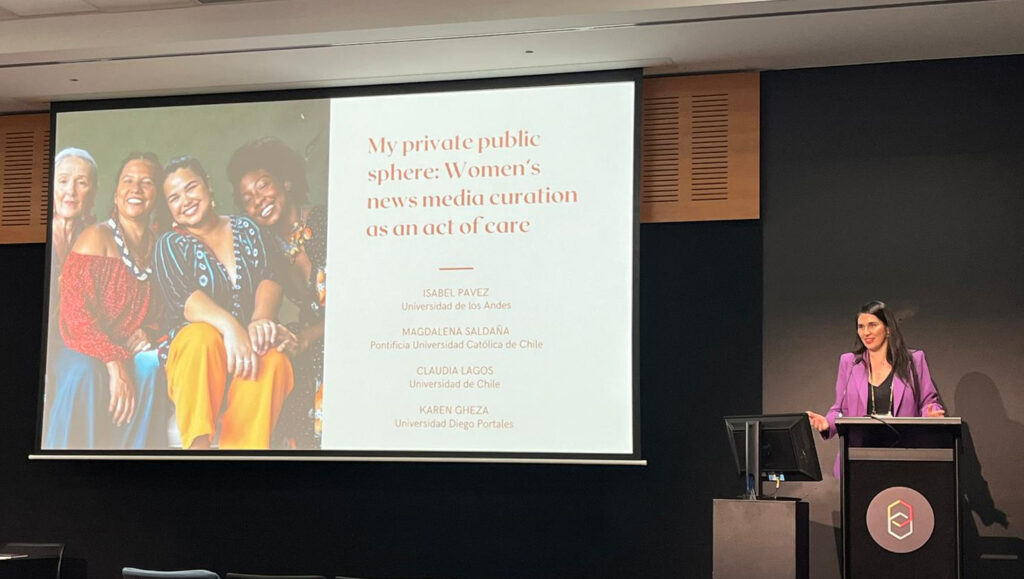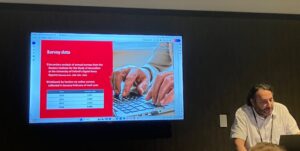Outstanding participation of IMFD researchers in the 74th ICA
July, 2024.- From June 20 to 24, the 74th annual conference of the International Communication Association was held in Gold Coast, Australia. 74th annual conference of the International Communication Association (ICA) was held in Gold Coast, Australia, from June 20 to June 20. (ICA), in which Magdalena Saldaña and Sebastián Valenzuela, both IMFD researchers and academics from the Communications Faculty of the Pontificia Universidad Católica de Chile, participated.
The ICA conference is the premier annual event for scholars and practitioners in the field of communication, where hundreds of research papers are presented to an average attendance of more than 3,000 scholars from around the world.
In the activities, participants have the opportunity to learn about research that is at the forefront of their areas of study, such as artificial intelligence, misinformation, algorithms and the effects of new technologies on society, says Sebastián Valenzuela. It also allows them to establish links and formal networks with researchers from around the world who are working on these topics, in addition to presenting their research to this audience.

Magdalena Saldaña, who is also alternate director of the MEPOP Nucleus, participated in four panels, presenting the research in which she is involved, and was also one of the organizers of the Virtual Preconference ICA 2024 "Media and Communication in Global Latinidades", which aimed to examine the various aspects of the production, distribution and consumption of media in the context of global Latinidades .
For both academics, one of the most relevant novelties of this congress was the participation of Latin American researchers, particularly from the Southern Cone, Chile and Argentina. "This was especially noticeable in that there were several People from our region occupying leading positions in different divisions, so there is a recognition of the research that many of us are doing in this part of the world, which is relevant not only for this place but for the planet as a whole", emphasizes Sebastián Valenzuela.
"Research on disinformation will continue to be in vogue, particularly disinformation in electoral periods, but it is clear that we need more comparative work and from the global south," says Magdalena Saldaña. "We already know a lot about the United States and Europe; it is time for the discipline to understand that, if we do not study other regions, or smaller countries, we will always be behind in understanding social phenomena," adds the academic, who was also invited to participate in a panel on challenges and opportunities on the horizon of political communication, in addition to participating in informal meetings with doctoral students interested in political communication issues.

Meanwhile, Sebastián Valenzuela, who is also principal investigator of the Millennium Nucleus on Digital Inequalities and Opportunities (NUDOS) participated in two panels focused on disinformation and news repertoire. "One of the clearest trends we saw at ICA is the research being done in relation to artificial intelligence, particularly generative intelligence," said the researcher, for whom "the skills of the People to deal with algorithms, known as algorithmic competence, and a significant increase in computational methods for research in communications" were also interesting topics addressed at the conference.
Sebastián Valenzuela Panels
HYBRID: Disinformation, Fake News, and Conspiracywith Truth Discernment to the Test: Examining Resilience to Misinformation in Chile during Political and Sanitary Crises, the research developed with Ingrid Bachmann, U. Católica de Chile; Constanza Mujica, U. Católica de Chile; Daniela Grassau, U. Católica de Chile; Claudia Labarca, U. Católica de Chile; and Daniel Halpern, U. Católica de Chile.
Studying News Repertoires: Do People Still Follow the News? with Patterns of Persistence: Studying News Repertoires before, during, and after COVID-19, together with Ingrid Bachmann, Pontificia U Católica de Chile, CHILE and Natalia Solis, Millennium Nucleus on Digital Inequalities and Opportunities (NUDOS).
Magdalena Saldaña Panels
Feminist Scholarchipwith the presentation "My Private-Public Sphere: Women's News Media Curation as an Act of Care".together with Isabel Pavez, U. de Los Andes; Claudia Lagos, U. de Chile; and Karen Gheza Correa, U. Católica de Chile.
Fighting Misinformation through Digital Forensics in the Classroom and Newsroom, with the presentation Misinformation in Polarizing Times: How Fact-Checking Organizations in Chile Improve the Quality of the Informational LandscapeMagdalena Saldana, Catholic University of Chile.
Elections: Identity, Framing, and Mediawith Disengaged or Disillusioned? Unpacking Voting Behavior in Times of Political Fatigue in Chilewith Marcelo Santos, U. Diego Portales; and Guillermo Bustamante-Pavez, U. de los Andes.
Changes, Challenges, and Opportunities on the Horizon in the Field of Political CommunicationThe panelist was joined by Robert Holbert (Temple), Benjamin Toff (Minnesota), Sangwon Lee (New Mexico State) and Emily Van Duyn (Illinois, Urbana-Champaign).
